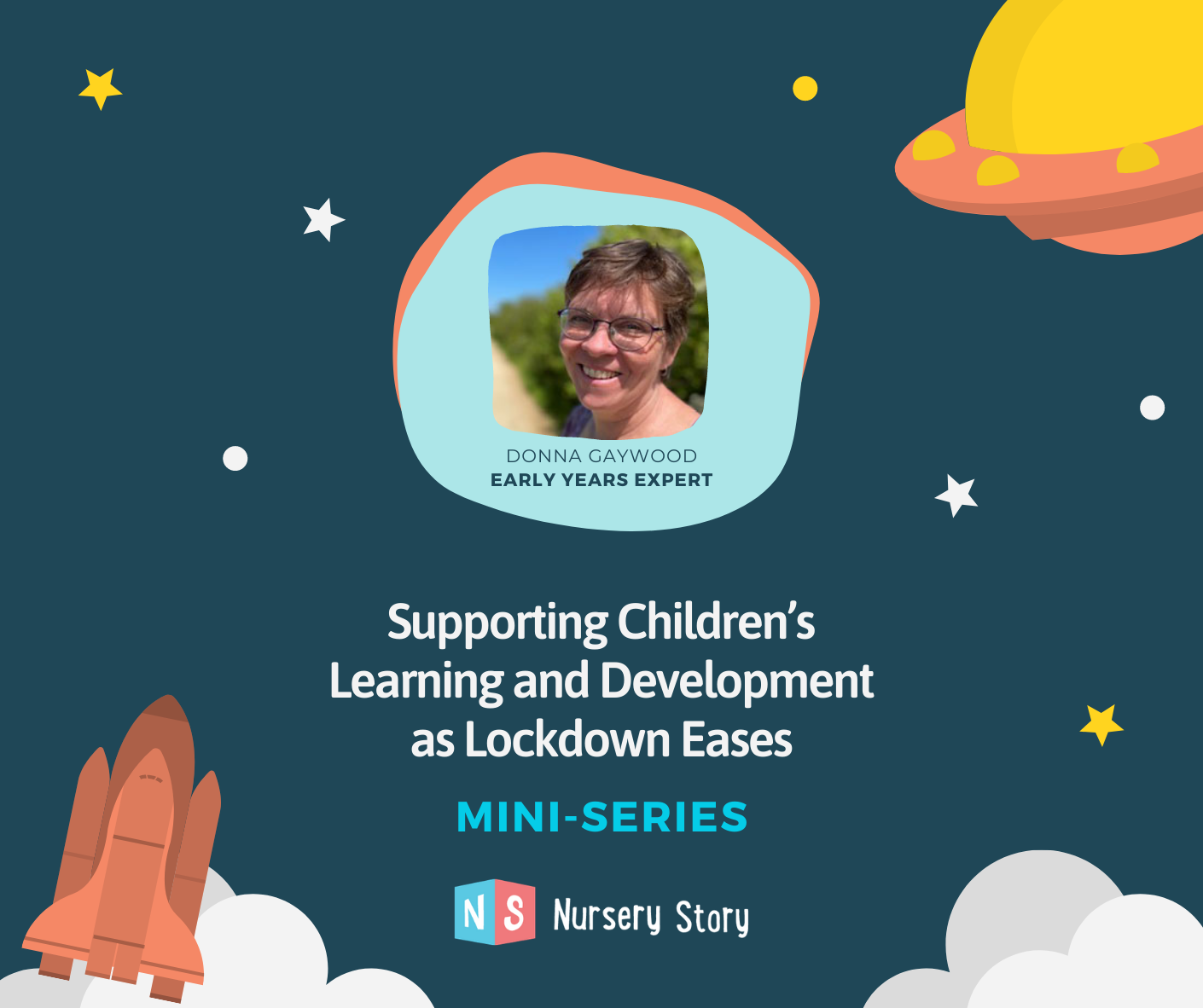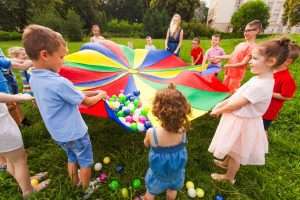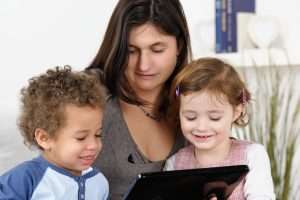[vc_row padding_top_multiplier=”” rc_link_color=”primary-1″ rc_link_hover_color=”primary-6″][vc_column][vc_row_inner padding_top_multiplier=””][vc_column_inner content_width=”70″][crocal_single_image image=”8591″ image_shape=”radius-10″][/vc_column_inner][/vc_row_inner][crocal_empty_space][vc_column_text]We are delighted to welcome you to our ‘Roadmap to Recovery’ mini-series with early years expert Donna Gaywood.
In the first installment of our mini-series, Donna reflects on the experiences of children over the past year and looks at how we can support children’s learning and development as lockdown eases and the changes we can make to our practice and environments.
Promoting play opportunities to help children process their experience.
A year of challenges for the early year sector
The COVID-19 pandemic has presented serious challenges to the whole country, with everyone learning how to live and work within new guidelines, to prevent the spread of an unseen virus. In the first lockdown, early educators across the sector enabled fellow key workers to continue to work and offered vital services to children with Education and Health Care plans, or those who are subject to Child Protection plans.
Many staff were furloughed, and some settings had to close temporarily, whilst others were unable to continue operating altogether. The second lockdown has been even more difficult with rigorous cleaning, safer working practices, “bubble” creation and maintenance, but many more children attending. Staff have also had to work whilst homeschooling their own children amid self-isolation and lateral flow testing. To say that this has been challenging for the sector, would be an understatement.
Children’s experiences during the pandemic
However, as life is beginning to return to normal, it is time to reflect on how the children have experienced this pandemic and how, as early years professionals, we can support them to process all they have witnessed and experienced in the last year. It is worth noting that for a two-year-old, one whole year is half their life, so for small children the recent events form a significant part of their formative years. Many children have spent extended time with their parents and maybe their siblings, with little interaction between close family or friends.
There will have been a variety of experiences. For some families this may have offered a chance to re-connect and enjoy a slower pace, while for other families the stress of proximity and concerns about finances might have created an intensity of emotion which has been a struggle to manage. What we know about children is that they are learning all the time.
Processing experiences through play
Children learn through what they see, what they experience and often act as a sensitive barometer, reflecting the emotional atmosphere of their situation. The role of early years practitioners to help children process their experiences should never be underestimated. In more “normal” times, there is a given understanding that children begin to make sense of their world and how they fit into it through role play. Every self-respecting early years setting has a home corner where children naturally flock and play out their everyday experiences. We see them make cups of tea, put their babies to bed and play out the relationships they have witnessed.
Supporting children process some of their new COVID experiences will require staff teams to re-evaluate their home corners and the resources in light of the last twelve months. Small but significant changes will offer children these opportunities. Adding face masks to the dressing up clothes, placing spots on the floor to replicate the two-metre rule now established in shops, including empty bottles of hand sanitisers or spray bottles with cleaning cloth and providing pretend ipads and mobile phones for them to speak to relatives are all likely to provide the extra stimulus for the children to begin the important processing play.
Prioritising storytelling to share pandemic stories
Recent research* published suggests that children benefit from being able to create their own stories about the virus, so they can develop a narrative to understand what has happened. To support them with this, a whole setting approach is likely to be most effective giving children space and time to develop their thinking.
Offering children time to talk in small groups with relevant objects or pictures as prompts could provide them with a starting point. It is likely that staff will need to scaffold the conversations and then set up follow on activities using art-based resources. Children can be encouraged to draw, make images using loose parts play, use storytelling with puppets or small world play.
Skilled and confident practitioners
The skill of the practitioner is key to draw out the children’s ideas and experiences to assist them in developing their own pandemic stories. These stories will not necessarily be completed in the first instance, so staff should plan to revisit them with the children and possibly document the learning to make a lasting record of the experiences.
It is important for staff to feel confident supporting children’s learning and development through play and arts-based activities. Faced with the experiences of the pandemic, children may play games or talk about things which staff find challenging so leaders and managers can help their staff by providing space and time for them to reflect as a team about their practice and the emerging stories of the children’s experiences.
Valuing open-ended outdoor play
Throughout the pandemic many people have accessed the outdoors in new ways. Research* suggests that children have also enjoyed this and seem to want to continue to spend extended time playing and learning outside. In practice it is often extremely difficult to maintain outdoor spaces and keep them well stocked with resources throughout the seasons. Finding time at the beginning of each session to set up provocations for play can be challenging, particularly for settings which open long hours. However, if staff are keen to support children to process their experiences as lockdown eases, enabling children increased access to outdoor spaces is important.
Again, a whole setting approach would be beneficial with leaders and managers actively promoting open-ended outdoor play, working closely with early years practitioners to remove the barriers that prevent this from happening on a daily basis. In addition, staff should keep a close eye on the patterns of play which develop in the outside spaces and determine to support, build on and extend the learning through in-the-moment planning, as well as more purposeful structured environmental plans.
Learning how to reconnect
One of the keenly felt consequences of the pandemic has been the isolation that people have experienced and the lack of contact with loved ones. Research* also shows that children have felt this too and have really missed seeing their friends in person. Many have expressed joy returning to their early education settings. To help children to process and manage this consequence of “lockdown,” staff need to think creatively how to capture and foster this returning joy.
Each set of children will be unique so how this is done is likely to vary, however all children would definitely benefit from extra time given to helping them reconnect with peers. Well planned games and activities could scaffold relationship building. Small key person group times would also be beneficial. Equally important is for children to have less structured times, apart from adults, to have further opportunities to reconnect and enjoy their peer’s company. Developing new spaces in the environment where small groups of two or three children can gather, for example in tents or dens, would again offer children further play experiences to come to terms and understand their changing world.
And finally…
Although there are a number of books which have been written to help young children understand changes in behaviours as a result of the pandemic, staff may want to think about collating their own book which documents the children’s experiences in the setting of the COVID-19 pandemic. For staff to work with the children and their families to document everyone’s experiences and the experience of the setting not only helps children regain a sense of belonging to a community of learning but also provides a clear group narrative which can be referred back to by the children. For the adults as well as the children, gathering photos, artwork and stories together could be cathartic following an extremely difficult year, providing an anchor in stormy seas and validating the many COVID-19 experiences.
* Bertram, T. and Pascal, C.(eds) (2021) European Early Childhood Education Research Journal, Special Issue: Plural Narratives about COVID-19 and Early Childhood. Vol 29. No 1. Routledge. [/vc_column_text][/vc_column][/vc_row][vc_row][vc_column css=”.vc_custom_1612518960691{padding: 20px !important;border: 3px dashed #e5e5e5 !important;border-radius: 15px !important;}”][vc_row_inner padding_top_multiplier=”” padding_bottom_multiplier=””][vc_column_inner width=”1/3″][crocal_single_image image=”8585″ image_shape=”radius-10″][/vc_column_inner][vc_column_inner width=”2/3″][/vc_column_inner][/vc_row_inner][crocal_empty_space height_multiplier=”custom” height=”15px”][crocal_title heading=”h6″]Donna Gaywood[/crocal_title][vc_column_text]Donna Gaywood Consultancy
LinkedIn[/vc_column_text][crocal_empty_space height_multiplier=”custom” height=”15px”][vc_column_text text_style=”small-text”]Donna Gaywood is a teacher who brings 30 years’ experience of working with children, young people, and adults to enable them to be resilient lifelong learners. Currently she supports very young children (0-5) who may be struggling with their social, emotional, or mental health development by working with their parents and early educators to develop shared learning plans. The aim of the plans is to promote positive outcomes for children and enable them to be able to access the Early Years curriculum, form strong bonds with their peers, develop resilience and improve their sense of wellbeing.
Donna has a B(Ed) Hons (2:1), an MA (Early Years) (with distinction), an NPQICL and is currently completing a PhD which is concerned with the lived experiences of very young refugee children. Donna is a member of the National Education Union (NEU) and is part of the NEU Early Years Reference group. Donna has been recently appointed as Project Co-ordinator for Birth to Five Matters.[/vc_column_text][/vc_column][/vc_row]




